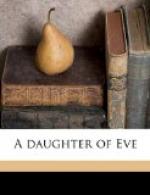Examining this society carefully, it was seen to present not only the brilliant tones and colors and outward adornment, but to have a soul, —it lived, it felt, it thought. Hidden passions gave it a physiognomy; mischievous or malignant looks were exchanged; fair and giddy girls betrayed desires; jealous women told each other scandals behind their fans, or paid exaggerated compliments. Society, anointed, curled, and perfumed, gave itself up to social gaiety which went to the brain like a heady liquor. It seemed as if from all foreheads, as well as from all hearts, ideas and sentiments were exhaling, which presently condensed and reacted in a volume on the coldest persons present, and excited them. At the most animated moment of this intoxicating party, in a corner of a gilded salon where certain bankers, ambassadors, and the immoral old English earl, Lord Dudley, were playing cards, Madame Felix de Vandenesse was irresistibly drawn to converse with Raoul Nathan. Possibly she yielded to that ball-intoxication which sometimes wrings avowals from the most discreet.
At sight of such a fete, and the splendors of a world in which he had never before appeared, Nathan was stirred to the soul by fresh ambition. Seeing Rastignac, whose younger brother had just been made bishop at twenty-seven years of age, and whose brother-in-law, Martial de la Roche-Hugon, was a minister, and who himself was under-secretary of State, and about to marry, rumor said, the only daughter of the Baron de Nucingen,—a girl with an illimitable “dot”; seeing, moreover, in the diplomatic body an obscure writer whom he had formerly known translating articles in foreign journals for a newspaper turned dynastic since 1830, also professors now made peers of France,—he felt with anguish that he was left behind on a bad road by advocating the overthrow of this new aristocracy of lucky talent, of cleverness crowned by success, and of real merit. Even Blondet, so unfortunate, so used by others in journalism, but so welcomed here, who could, if he liked, enter a career of public service through the influence of Madame de Montcornet, seemed to Nathan’s eyes a striking example of the power of social relations. Secretly, in his heart, he resolved to play the game of political opinions, like de Marsay, Rastignac, Blondet, Talleyrand, the leader of this set of men; to rely on facts only, turn them to his own profit, regard his system as a weapon, and not interfere with a society so well constituted, so shrewd, so natural.




